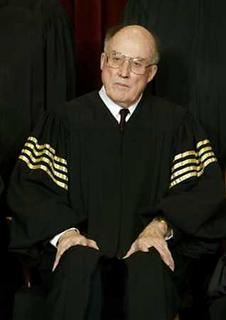
Rumors are swirling that Chief Justice William Rehnquist will announce his retirement when President Bush gets back this afternoon from the G8 Summit in Scotland.
A double-vacancy is a rare thing. It hasn't happened since 1971, when Rehnquist and Lewis F. Powell Jr. were appointed to the court by President Nixon.
What should be President Bush's strategy? Should he nominate one tried-and-true conservative and one moderate as a sort of compromise, or nominate two solid, strict constructionists?
In my opinion the latter is the better option. I think the Left will attempt to characterize Bush's nominees as far-right ideologs as a matter of political strategy, with no real interest in being passified by a moderate pick. In light of the political realities, he may as well nominate people he'd truly like to see on the court.
A story in today's Washington Post outlines Bush's options as they appear at the moment:
It would put a lot of pressure on the system if he retired now," said former White House counsel C. Boyden Gray, another key outside strategist aiding the White House. "God, it would make it an interesting summer. It's going to be interesting enough as it is."Even factoring Scalia out of the equation, Bush has different calculations for a chief justice than for O'Connor's seat. In looking for a chief justice, some White House advisers said, they would consider management experience and look for a deeper legal résumé than for an associate justice.
If Rehnquist does retire, the advisers said, then the White House must decide whether to fill his seat first and let a replacement for O'Connor go second as she indicated in her retirement letter that she would continue to serve until a successor is confirmed. And Bush must decide whether to package a staunch conservative with a less conservative nominee such as Gonzales in hopes of satisfying various constituencies enough to ease confirmation, or to favor a bolder approach by advancing two reliable conservatives.
If Rehnquist does not retire right away, Bush faces a similar choice, in that he could go with a conservative first and wait to nominate Gonzales for the next opening, or the other way around. But in picking an O'Connor replacement now, he would have to hold back the nominee he actually wants for chief justice.
"I may be totally wrong on this, but I think he means to change the court and that he would not be sending a balancer-type candidate," said Paul M. Weyrich, chairman of the Free Congress Foundation and a leading conservative voice in Washington. "Now it could be that friendship with Gonzales outweighs that. I don't know. But in the discussions I've had with him, he seems generally committed to changing the composition of the court."
You can read the story in its entirety by clicking HERE.
1 comment:
What an opportunity. GW will need much wisdom for this one. I think his advisors will calculate who will likely be accepted or highly contested and on what issues. I think he will have to concede ground to the opositions biggest issue though. I am just guessing that he will suggest somemone that will not be all we would want on that point but will be solid on other important issues. Just a touch more conservative by two justices could make a big difference since alot of issues are closely contested. (or so I think) Also, he has a lot of things he wants to accomplish in the next 2 years and a huge partisan battle may not be affordable, politically speaking.
I'll bet T.K. hasn't been off the phone or stopped cussing since it was announced.
Post a Comment